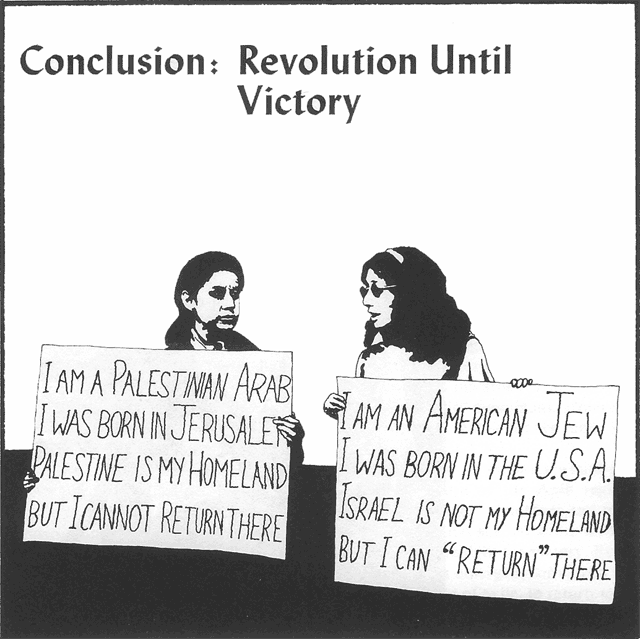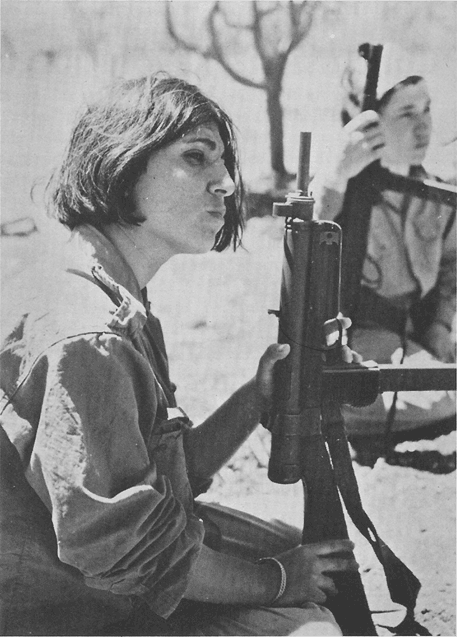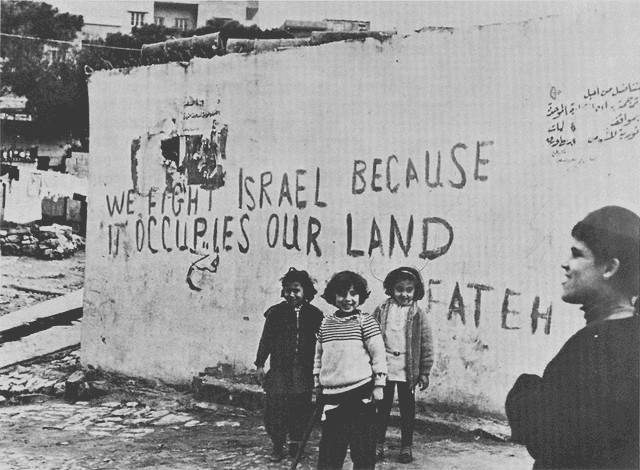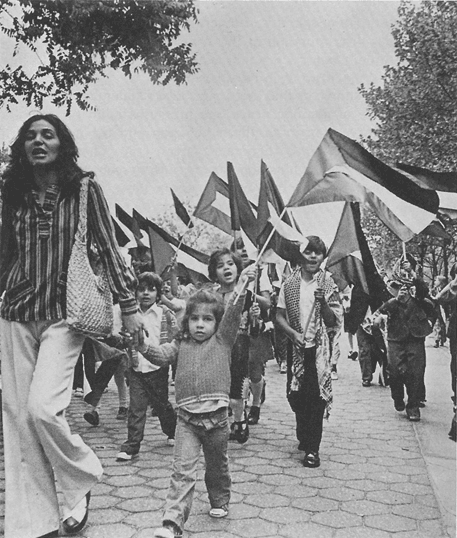Our Roots Are Still Alive - Conclusion
Previous: Chapter 18
Table of Contents
Next: Postscript
New Jersey Solidarity-Activists for the Liberation of Palestine Main Site

- You may take the last strip of our land
Feed my youth to prison cells
You may plunder my heritage
You may burn my books, my poems,
Or feed my flesh to the dogs
You may spread a web of terror
On the roofs of my village
O ENEMY OF THE SUN
But
I shall not compromise
And to the last pulse in my veins
I shall resist.
Throughout their history, the Palestinian people have endured countless attacks on their land and their lives, and they have resisted the many enemies who sought to conquer them. In this century, the Palestinians, like other Arab peoples, have fought for the right to nationhood-the right to determine their own future in Palestine. In this era of national liberation, the fight of the Palestinians for their homeland is both just and irreversible. There can be no other solution to the problems facing the Palestinians. They are at the heart of the whole crisis in the Middle East. Until they gain their national rights, there will be no peace in the area.

The empires of the world have never accepted this fact. The British came to the Middle East at the close of the nineteenth century, looking for oil, stable colonies and a garrison near the Suez Canal. They deceived and betrayed the Arabs, especially the Palestinians. The British thought they could ignore or destroy the force of Palestinian nationalism. But despite betrayals by their traditional leaders, the Palestinian people continually fought for independence.
After World War II, the United States emerged as the most powerful imperialist country. It captured the lion's share of Middle Eastern oil-a vital resource for its expanding empire. The United States too opposed Palestinian nationalism, and used direct military intervention, massive arms aid and CIA-style covert activities to shore up conservative Arab governments and to protect American investments.
Both Britain and the United States supported the creation of a Zionist settler colony in Palestine as one way to extend their control in the Middle East and to safeguard their interests. The European Jewish settlers who came to colonize Palestine identified with their imperialist sponsors, and rapidly became enemies of the Palestinians. Zionism refused to admit the existence of the Palestinian people, let alone recognize the validity of their fight for nationhood.
In 1948, 1956 and 1967, Israel-with the support of Western powers-went to war against the Palestinian and Arab peoples. But these declared wars were only part of a larger war to crush the Palestinian nation. In the last thirty years, Israel destroyed several hundred Arab villages and expelled over one million Palestinian people Israeli and Western leaders were convinced that Israel's superior military power would easily crush the Palestinian movement and force the Arab states to recognize Israel's existence.
But Palestinian resistance has shattered the illusions of these twentieth century conquerors. The freedom fighters and demonstrators of today are part of an unbroken chain of resistance that reaches back to the beginning of the century and the Arab Revolt. The 1936-39 Palestinian rebellion shocked both British and Zionists with its strength and tenacity. The refusal of the Palestinians to forget and renounce their homeland after their expulsion in the 1948 War sabotaged the plans of Israel and the U.S. for the area. Today Palestinians who have never seen their homeland have joined with Palestinians under Israeli occupation in a massive resistance. They have also become a leading force in every Arab nationalist movement. Homeless, the Palestinians have been the fiercest advocates of independence and self-determination for all peoples in the Middle East.
In the early years of exile, Palestinians hoped that the Arab states would help them return to Palestine. But as the conservative nature of the Arab regimes became clear, these hopes soon faded. The struggles of Algeria, Vietnam and other African, Asian and Latin American nations taught them that success came through self-reliance and a total mobilization of all the people in the fight for victory. By the mid-1960s, the independent, armed Palestinian movement emerged, convinced that only the Palestinians themselves could lead their people out of exile, to return to the land that Israel occupied.
In their drive to return to their homeland, the Palestinians have seen Zionism and the state of Israel, not the Jewish people, as their enemy. The Palestinians and their representative organization, the PLO, recognize that any solution to the homelessness of their people has to include Israel's Jews. Only the creation of a democratic secular state in all of Palestine can provide a just and lasting solution for both Palestinians and Jews in the area. The PLO has pledged itself to the fight against all forms of racism and religious discrimination, including anti-Semitism and Zionism. It has made the crucial distinction between anti-Zionism and anti-Semitism, between opposition to the Zionist movement and racism against Jews-a distinction which the state of Israel has consistently tried to blur among its supporters.
Both the United States and Israel have opposed every step the Palestinians have taken toward their goal of a democratic secular state. Since the emergence of the fedayeen in the 1960s, the United States and Israel have been trying to either destroy the PLO or weaken it so much that it can be excluded from any role in U.S.-sponsored negotiations. In Israel's 1967 offensive against the Palestinians and the Arab states, in Jordan's Black September attack in 1970 and in the 1973 rightist attacks on the Palestinians in Lebanon, the allies of the United States tried to destroy the guerrilla movement. But each time they failed.

The U.S. Settlement
When Henry Kissinger launched the U.S. "peace offensive"-an attempt to impose a settlement on the area that would safeguard U.S. oil interests, protect Arab regimes friendly to the United States, give Israel secure borders and exclude the Palestinians-it floundered on the rock of Palestinian resistance. Once more the United States and its allies tried to destroy the Palestinian movement, this time in Lebanon-its last and strongest base outside the occupied territories. Once again they failed because ordinary people, like the inhabitants of Tal al Zaatar, performed extraordinary deeds, refusing to surrender even against impossible odds. They failed also because Lebanese and Palestinians stood together in an alliance that could not be shattered-the kind of alliance that will continue to be forged between the Palestinians and other Arab peoples who have a common interest in fighting imperialist domination.
The latest U.S. proposals for a Middle East settlement that excludes the Palestinians or by-passes the PLO are also doomed to failure. President Carter endorses the vague notion of a Palestinian "homeland" federated with Jordan, on condition that the PLO renounce its goal of a democratic secular state in Palestine. In seeming contradiction, the new rightist Israeli government of Menahem Begin refuses outright to consider any negotiation with the PLO under any circumstances. Yet in essence, the United States and Israel agree: neither is willing to recognize the right of the Palestinian people to self-determination in their homeland, free of the racism and religious discrimination of the Jewish state. In fact, neither the Israeli nor the U.S. government wants a just and lasting peace in the area. In this intransigence lie the seeds of the fifth Arab-Israeli war.
History has shown us that there cannot be a stalemate in the Middle East for long. In the absence of genuine peace, the pressures build for war. Expansionist Israel threatens intervention in southern Lebanon and the new Begin government calls the occupied West Bank "liberated" Israeli land. The governments of Egypt and Syria are under tremendous popular pressure to recover their lands which Israel occupies. If the Arab countries cannot regain these through settlement, war will be their only option. A new Arab-Israeli war, once begun, could easily lead to U.S. military intervention and a confrontation between the United States and the Soviet Union, with dangerous consequences for the whole world.
The only real alternative to another war is the political solution of the underlying conflict that has beset the region for decades. Since the early days of the mandate period, the Palestinian people have fought for the right to self-determination in their homeland. In the last decade the PLO-the representative voice of the Palestinian people-has had great success in gaining recognition and support from progressive people around the world, winning them to the goal of a democratic secular state. Each year the Palestinians have found new friends and allies, while Israel has become increasingly isolated.
A graphic example of this process is now unfolding in southern Africa. While the PLO builds stronger ties with the African guerrillas fighting for majority rule, Israel strengthens its links through trade and arms sales with the apartheid regime of South Africa. Israel's growing isolation and increasing economic and political crises force it to rely more and more on the United States for political and economic support. But U.S. imperialism has itself been weakened around the world, following its defeat in Indochina and setbacks to its allies in southern Africa. As a result, more people in the United States are opposing their government's support of racist and reactionary regimes. A growing number of Americans are coming to understand that the state of Israel is such a regime.
The PLO has called on the people of the world, and the American people in particular, to examine for themselves the history of the Palestinians and Israel-a history that has been distorted and buried in this country. The Palestinians believe that people who learn their story will understand that only an end to religious and racial discrimination and the establishment of a democratic secular state in Palestine can provide a long-term solution to this bitter conflict. The PLO asks the American people to insist that their government recognize the PLO as the representative of the Palestinian people, and urges all Americans to take action against U.S. support of Israel and the right-wing Arab states.

Children in New York demonstrate in solidarity with Palestine, 1976.
In his 1974 address to the United Nations, Yasser Arafat called on the American people and the international community to join with the Palestinian people in their struggle for a just and lasting peace in the Middle East. He knew that the road would be long and hard, and that it would not be simple to heal the divisions that have plagued Palestine in this century. But he appealed to all those who have fought for freedom and against bigotry and discrimination to share with him and his people the dream of a peaceful future. Describing the harassment and imprisonment of a Christian priest and a Jewish revolutionary inside Israel who had supported the Palestinians, he said:
- Why therefore should I not dream and hope? For is not revolution the making real of dreams and hopes? So let us work together that my dream may be fulfilled, that I should return with my people out of exile, there in Palestine to live with this Jewish freedom fighter and his partners, with this Arab priest and his brothers, in one democratic state where Christian, Jew and Moslem
live in justice, equality and fraternity."